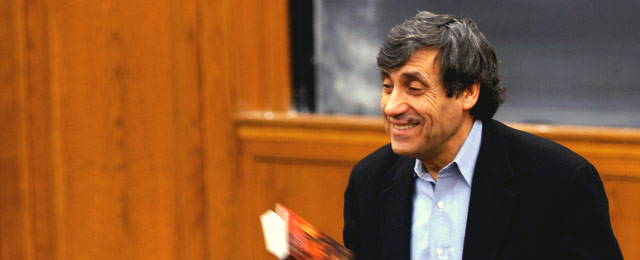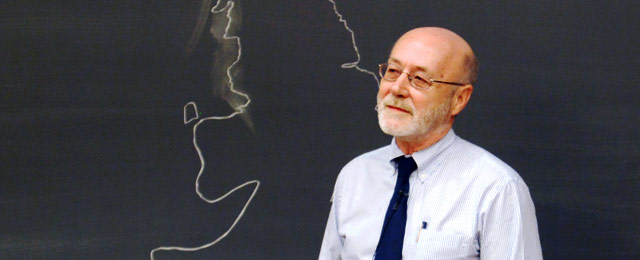Online courses directory (457)
This class is divided into a series of sections or "modules", each of which concentrates on a particular large technology-related topic in a cultural context. The class will start with a four-week module on Samurai Swords and Blacksmithing, followed by smaller units on Chinese Cooking, the Invention of Clocks, and Andean Weaving, and end with a four-week module on Automobiles and Engines. In addition, there will be a series of hands-on projects that tie theory and practice together. The class discussions range across anthropology, history, and individual development, emphasizing recurring themes, such as the interaction between technology and culture and the relation between "skill" knowledge and "craft" knowledge.
Culture Tech evolved from a more extensive, two-semester course which formed the centerpiece of the Integrated Studies Program at MIT. For 13 years, ISP was an alternative first-year program combining humanities, physics, learning-by-doing, and weekly luncheons. Culture Tech represents the core principles of ISP distilled into a 6-unit seminar. Although many collections of topics have been used over the years, the modules presented here are a representative sequence.
Culture, Embodiment, and the Senses will provide an historical and cross-cultural analysis of the politics of sensory experience. The subject will address western philosophical debates about mind, brain, emotion, and the body and the historical value placed upon sight, reason, and rationality, versus smell, taste, and touch as acceptable modes of knowing and knowledge production. We will assess cultural traditions that challenge scientific interpretations of experience arising from western philosophical and physiological models. The class will examine how sensory experience lies beyond the realm of individual physiological or psychological responses and occurs within a culturally elaborated field of social relations. Finally, we will debate how discourse about the senses is a product of particular modes of knowledge production that are themselves contested fields of power relations.
This course examines computers anthropologically, as artifacts revealing the social orders and cultural practices that create them. Students read classic texts in computer science along with cultural analyses of computing history and contemporary configurations. It explores the history of automata, automation and capitalist manufacturing; cybernetics and WWII operations research; artificial intelligence and gendered subjectivity; robots, cyborgs, and artificial life; creation and commoditization of the personal computer; the growth of the Internet as a military, academic, and commercial project; hackers and gamers; technobodies and virtual sociality. Emphasis is placed on how ideas about gender and other social differences shape labor practices, models of cognition, hacking culture, and social media.
The goal of this seminar is to have open discussions of controversial political and social issues and raise awareness of current world events in an informal setting. Discussions for the first part of each class will focus on current events from that week, while in the second part of class students will discuss a scheduled issue in greater detail. Scheduled issues include the wars in Iraq and Afghanistan, the regulation of marijuana, how our society should punish criminals, genocide in Rwanda and Sudan, discrimination in our society today, the future of social security, whether pornography is sexist, and where we can go from here in the Arab/Israeli Conflict. Discussions will be supplemented by readings, films, and public speakers. Students will also be encouraged to read news media from around the world.
The goal of this seminar is to have open discussions of controversial political and social issues and raise awareness of current world events in an informal setting. Discussions for the first part of each class will focus on current events from that week, while in the second part of class students will discuss a scheduled issue in greater detail. Scheduled issues include the wars in Iraq and Afghanistan, the regulation of marijuana, how our society should punish criminals, genocide in Rwanda and Sudan, discrimination in our society today, the future of social security, whether pornography is sexist, and where we can go from here in the Arab/Israeli Conflict. Discussions will be supplemented by readings, films, and public speakers. Students will also be encouraged to read news media from around the world.
The course is an introduction to Dante and his cultural milieu through a critical reading of the Divine Comedy and selected minor works (Vita nuova, Convivio, De vulgari eloquentia, Epistle to Cangrande). An analysis of Dante's autobiography, the Vita nuova, establishes the poetic and political circumstances of the Comedy's composition. Readings of Inferno, Purgatory and Paradise seek to situate Dante's work within the intellectual and social context of the late Middle Ages, with special attention paid to political, philosophical and theological concerns. Topics in the Divine Comedy explored over the course of the semester include the relationship between ethics and aesthetics; love and knowledge; and exile and history.
Humans are social animals; social demands, both cooperative and competitive, structure our development, our brain and our mind. This course covers social development, social behaviour, social cognition and social neuroscience, in both human and non-human social animals. Topics include altruism, empathy, communication, theory of mind, aggression, power, groups, mating, and morality. Methods include evolutionary biology, neuroscience, cognitive science, social psychology and anthropology.
Gain an understanding of the political, social, cultural, economic, institutional and international factors that foster and obstruct the development and consolidation of democracy. It is hoped that students in developing or prospective democracies will use the theories, ideas, and lessons in the class to help build or improve democracy in their own countries.
This class investigates theory and practice of digital or new media poetry with emphasis on workshop review of digital poetry created by students. Each week students examine published examples of digital poetry in a variety of forms including but not limited to soundscapes, hypertext poetry, animation, code poems, interactive games, location-based poems using handheld devices, digital video and wikis.
Educational psychology is concerned with how students learn and develop. It emphasizes trends in educational development while also focusing on educational diversity. For teachers and trainers to fulfil their instructional role most effectively, their teaching methods must be grounded in educational psychology. Educational psychology provides a framework for teachers and trainers to plan, create and deliver effective lessons, and assess each student's learning. <br /><br />In this free online course, you will explore the topic of educational psychology in detail. Key development theories related to the learning process are examined and practical classroom examples are supplied to engage the you throughout the course. Vital material about student diversity is also presented, including strategies and information about working with students with special educational needs. <br /><br />This free online course will be of great interest to professionals in the education sector who would like a greater knowledge and understanding of educational psychology.<br />
A large proportion of contemporary research on organizations, strategy and management relies on quantitative research methods. This course is designed to provide an introduction to some of the most commonly used quantitative techniques, including logit/probit models, count models, event history models, and pooled cross-section techniques.
In this course, you will be exposed to the work of many great documentary photographers and photojournalists, as well as to writing about the documentary tradition. Further, throughout the term, you will hone your photographic skills and 'eye,' and you will work on a photo documentary project of your own, attempting to reduce a tiny area of the moving world to a set of still images that convey what the viewer needs to know about what you saw—without hearing the sounds, smelling the odors, experiencing what was happening outside the viewfinder, and without seeing the motion.
In this course, you will be exposed to the work of many great documentary photographers and photojournalists, as well as to writing about the documentary tradition. Further, throughout the term, you will hone your photographic skills and 'eye,' and you will work on a photo documentary project of your own, attempting to reduce a tiny area of the moving world to a set of still images that convey what the viewer needs to know about what you saw—without hearing the sounds, smelling the odors, experiencing what was happening outside the viewfinder, and without seeing the motion.
This free five-module online introductory course gives you the essential concepts, techniques, and skills to effectively work with data and produce compelling data stories under tight deadlines. Comprised of video lectures, tutorials, assignments, readings, and discussion forums, this course is open to anyone in the world with an Internet connection who wants to tell stories with data. Our media environment is increasingly saturated with data, including large collections of leaked documents published by Wikileaks, public databases about lobbying or government spending, and “big data” from social networks such as Twitter and Facebook. As a result, many media organisations seek data-savvy journalists to help them process this information to understand what is in it, to identify what is important, and to provide insights to readers in a compelling way. Modules: 1. Data journalism in the newsroom, with instructor Simon Rogers 2. Finding data to support stories, with instructor Paul Bradshaw 3. Finding story ideas with data analysis, with instructor Steve Doig 4. Dealing with messy data, with instructor Nicolas Kayser-Bril 5. Telling stories with visualization, with instructor Alberto Cairo Meet the instructors: Recommended reading: The Data Journalism Handbook Sponsors: Google; Ministry of Education, Culture and Science of the Netherlands; African Media Initiative; The World Bank Advisory board: Justin Arenstein (African Media Initiative); Josh Hatch (The Chronicle of Higher Education); Scott Klein (ProPublica); Angélica Peralta Ramos (La Nacion, Argentina); Aron Pilhofer (The New York Times); Guido Romeo (Wired Italy); Sascha Venohr (Zeit Online) Organisers: The European Journalism Centre is a non-profit international foundation with the remit to improve, strengthen, and underpin journalism and the news media in the interest of a functioning democratic public sphere. This mission has two main aspects: safeguarding, enhancing, and future-proofing quality journalism in Europe and the world and media freedom in emerging and developing countries. Data Driven Journalism is one of the leading initiatives for training, resources and networking in the area of data journalism. Founded in 2010, the programme is dedicated to accelerating the diffusion and improving the quality of data journalism around the world. We run the website DataDrivenJournalism.net as well as the School of Data Journalism, and produced the Data Journalism Handbook. For more information about this course, please visit the course website.
Don Francis, a pioneer in the field of HIV/AIDS research, had a long history as a pediatrician and an employee of the CD
Ce cours propose de dresser en premier lieu un état de la planète en termes de répartition de la richesse sur terre et de problèmes environnementaux globaux. A partir de là d'envisager les scénarios possibles et d'approfondir la notion de durabilité.
This course begins with a study of the role of dynamics in the general physics of the atmosphere, the consideration of the differences between modeling and approximation, and the observed large-scale phenomenology of the atmosphere. Only then are the basic equations derived in rigorous manner. The equations are then applied to important problems and methodologies in meteorology and climate, with discussions of the history of the topics where appropriate. Problems include the Hadley circulation and its role in the general circulation, atmospheric waves including gravity and Rossby waves and their interaction with the mean flow, with specific applications to the stratospheric quasi-biennial oscillation, tides, the super-rotation of Venus' atmosphere, the generation of atmospheric turbulence, and stationary waves among other problems. The quasi-geostrophic approximation is derived, and the resulting equations are used to examine the hydrodynamic stability of the circulation with applications ranging from convective adjustment to climate.
The letters of Paul are the earliest texts in the Christian scriptures, written by a Jew at a time when the word “Christian” hadn’t yet been coined. What is the religious and political context into which they emerged? How were they first interpreted? How and why do they make such an enormous impact in Christian communities and in politics today?
Archaeological materials and ancient writings will help you to enter the ancient Mediterranean world and to think about religious groups, power, poverty, health, and the lives of elites and slaves in the Roman Empire. We’ll explore how immediately controversial these letters were, and how these letters are used today to debate relations between Christians and Jews; issues such as love, law, and grace; and topics such as charismatic Christianity, homosexuality, and women’s religious leadership.
Whether you’ve been studying Paul’s letters for years or are merely curious about what Christian scriptures are, this course will provide you with information to deepen your understanding of the ancient contexts and present-day controversies about these texts.
Before your course starts, try the new edX Demo where you can explore the fun, interactive learning environment and virtual labs. Learn more.
HarvardX requires individuals who enroll in its courses on edX to abide by the terms of the edX honor code. HarvardX will take appropriate corrective action in response to violations of the edX honor code, which may include dismissal from the HarvardX course; revocation of any certificates received for the HarvardX course; or other remedies as circumstances warrant. No refunds will be issued in the case of corrective action for such violations. Enrollees who are taking HarvardX courses as part of another program will also be governed by the academic policies of those programs.
HarvardX pursues the science of learning. By registering as an online learner in an HX course, you will also participate in research about learning. Read our research statement to learn more.
Harvard University and HarvardX are committed to maintaining a safe and healthy educational and work environment in which no member of the community is excluded from participation in, denied the benefits of, or subjected to discrimination or harassment in our program. All members of the HarvardX community are expected to abide by Harvard policies on nondiscrimination, including sexual harassment, and the edX Terms of Service. If you have any questions or concerns, please contact harvardx@harvard.edu and/or report your experience through the edX contact form.
This course is intended to provide an up-to-date introduction to the development of English society between the late fifteenth and the early eighteenth centuries. Particular issues addressed in the lectures will include: the changing social structure; households; local communities; gender roles; economic development; urbanization; religious change from the Reformation to the Act of Toleration; the Tudor and Stuart monarchies; rebellion, popular protest and civil war; witchcraft; education, literacy and print culture; crime and the law; poverty and social welfare; the changing structures and dynamics of political participation and the emergence of parliamentary government.
Through some of the most celebrated examples of the early Renaissance architecture and the most important statements of the early Renaissance theories, the course will examine problems of the architectural spaces, technology and forms looking to the antiquity in the XV century in Italy.
Trusted paper writing service WriteMyPaper.Today will write the papers of any difficulty.


















